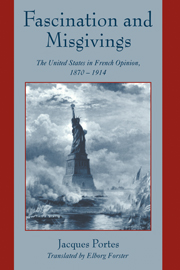Book contents
- Frontmatter
- Contents
- Preface
- Introduction
- Part I The United States as Exoticism
- Part II Models from the United States
- Part III The United States as Power
- 12 Immigration: Strength or Weakness?
- 13 Business
- 14 And Now, Imperialism
- 15 Is There a Culture in the United States?
- Conclusion
- Selective Bibliography
- Index
14 - And Now, Imperialism
Published online by Cambridge University Press: 07 October 2009
- Frontmatter
- Contents
- Preface
- Introduction
- Part I The United States as Exoticism
- Part II Models from the United States
- Part III The United States as Power
- 12 Immigration: Strength or Weakness?
- 13 Business
- 14 And Now, Imperialism
- 15 Is There a Culture in the United States?
- Conclusion
- Selective Bibliography
- Index
Summary
It is only normal to expect an economically powerful and politically stable nation such as the United States to assert itself on the international scene and to bring the weight of its interests to bear on its neighbors. It is therefore not surprising that in the post–Civil War period the French, even in leftist circles, closely watched and eventually approved of the American administration's annexationist impulses in the direction of Santo Domingo, Alaska, and even Canada. Wearing the halo of victory, which was seen as the triumph of democracy and freedom, the Americans were bound to improve the fate of the populations in these territories.
Yet William Seward eventually had to cease his bluster and the Great Republic seemed to turn away from any foreign adventure. Without known foreign enemies, its army very soon returned to its skeletal proportions and its domestic tasks, and its leaders showed no desire to enhance their prestige by international posturing, with the short-lived exception of James G. Blaine, who waved the flag of a worrisome pan-Americanism.
However, certain French observers felt that this was an abnormal situation. They ranged from Claudio Jannet, who, unable to forget the annexationism he had seen before the Civil War, considered Mexico and Canada the next victims of Uncle Sam's appetite, to the author writing in the Journal des Economistes, who in his respect for the “natural laws of expansion” thought in 1888 that “… an American expedition to conquer Europe in the twentieth or twenty-first century is no more extraordinary or impossible than the European expeditions of the sixteenth, seventeenth, and eighteenth centuries.”
- Type
- Chapter
- Information
- Fascination and MisgivingsThe United States in French Opinion, 1870–1914, pp. 389 - 415Publisher: Cambridge University PressPrint publication year: 2000



